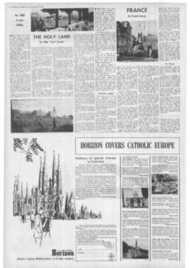Page 16, 1st January 1965
Page 16

Report an error
Noticed an error on this page?If you've noticed an error in this article please click here to report it.
Tags
Share
Related articles
Spain Waiting For
Religion In Barcelona Greater Liberty
Protestants In Spain
Statue Of Stalin To Be Centre Piece Of Republican Spain
Gen. Franco Sanctions Religious Freedoms
Long road to free worship
FROM A SPECIAL CORRESPONDENT MADRID
SPECIAL sprayers were offered at Christmas in many Spanish churches, both Catholic and Protestant, for religious liberty.
Such religious liberty can come only when both indifference and stiff opposition have been overcome. The opposition is on an official level as well as a private one.
But there is hope on the horizon. "We know we'll have to wait a bit longer, hut we have waited for years and years, so a matter of a few more months is unimportant," said one Protestant leader.
Although there is little doubt in ecclesiastical circles that the long-awaited Protestant "Bill of Rights" will eventually become law in Spain. granting official tolerance to Protestants and other non-Catholic worshippers, Catholic sources are convinced that it will take longer than "a few months", The hold-up at the Vatican Council gave several important ultra-conservative Spanish Cabinet Ministers the opportunity to stall progress of the Bill through the cabinet.
CornmiSSiOn
The Liberal-minded Minister of Information, Sr. Manuel Fraga Iribarne, announced shortly berme the last Council session: "The Protestant Bill has been submitted for study to an inter-ministerial commission, whose d:scussions will take into account whatever the Ecumenical Council disposes on the matter."
This statement meant that Protestants would have to wait at least until the expected 1965 session of the Ecumenical Council before the Bill could start to move again through the Spanish Parliament.
In recent years there has been a noticeable tide of liberalism in the government's a it itude towards non-Catholic faiths. New Protestant places of worship are opening up almost monthly in different parts of the country, and recently the government authorised a small Protestant library in Barcelona.
The Protestants, an estimated 30,000 in Spain, have many supporters amongst officials in high government posts and many of Spain's Catholic hierarchy want to see changes, But for Protestants. progress is nail-bitingly slow and they are frightened of Right-wing influence against them.
The Protestants hope that the "Bill of Rights" will bring then, a life free of official and unofficial prejudice. They want a place in Spain's modern progress the r'ght to hold government appointments, and schools to train future ministers and educate their children in their own faith.
They want their clergy to he allowed to officiate at legally recognised marriage ceremonies, and they want private cemeteries.
The "Bill of Rights" as it is
now written, will give them these privileges. All religions will he on an equal footing within the law, hut they would not he allowed to seek converts from Spain's official religion, Catholicism.
General Franco, the Head of State, is said to view the subject strictly as a matter of political expediency with no burning views against it, but reserving his judgment.
Apathy
One of the powerful opponents of the new statute is said to be the Minister of the Interior, Sr. Camilo Alonso Vega, but is is worth noting that not one high government official has openly spoken against the Bill. Several leading Church figures, on the other hand, have made their feelings against the Bill known. The man in the street is apathetic not because he is against freedom of religion but because he is generally ignorant that such a problem exists in Spain, where Protestants make up only one per cent of the population. Neither radio. Press nor television has brought the Bill to the public for discussion.
Thinking people know that change is on the way in a booming Spain. A country which for centuries has been stereotyped in its way of life has over a few years taken its place in the modern world. The way of life of the young people, the increasing amount of spending money and the glow of general prosperity has caused the powerful Catholic Church to "gel with it".
When religious liberty for Protestants does come about, the average Spaniard will put it down to Spain's modern era and it will hardly cause a stir among the people in general.
blog comments powered by Disqus

















